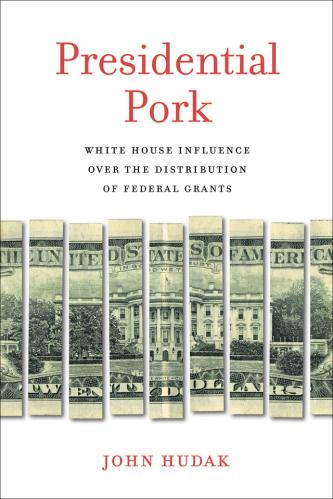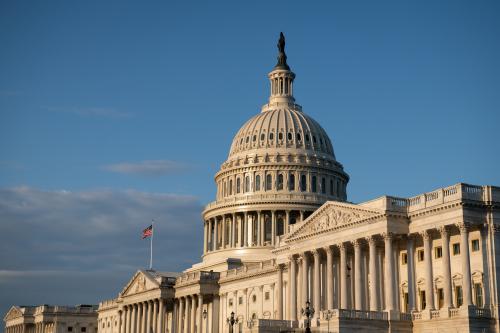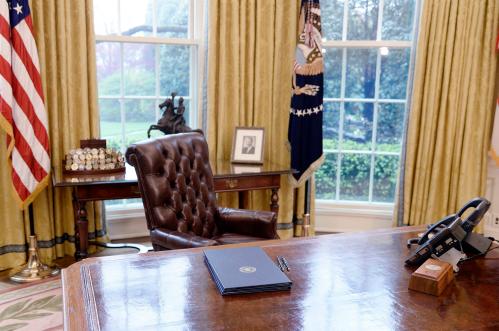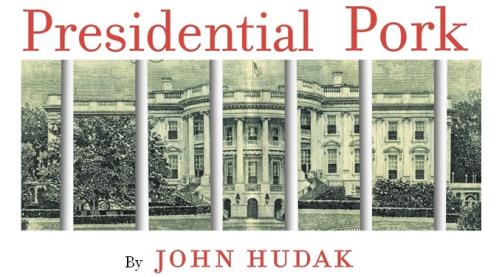As America plunges into recession, Congress and President Donald Trump have approved a series of aid packages to assist businesses, the unemployed, and others impacted by COVID-19. The first three aid packages will likely be supplemented by at least a fourth package, as the nation’s leaders better understand the depth and reach of the economic downturn. As the government pumps several trillion dollars into the economy via a variety of policy avenues, the question of oversight becomes a serious one. How will government guard against waste, fraud, and abuse, and who will be charged with evaluating whether and to what extent the stimulus packages achieved their goals?
The Trump administration and Congress face daunting tasks in overseeing what may eventually peak as a 15-digit-dollar response. And while it eschews looking to his predecessor’s administration for advice and guidance, the Trump administration should look to the Obama administration as a model of oversight. The Obama administration’s American Recovery and Reinvestment Act (ARRA) sought to jump-start the economy as part of a series of aid packages passed in late 2008 and into 2009. ARRA was successful in achieving its goals and, despite some administrative challenges, faced very little waste, fraud, and abuse.
Another area in which ARRA was successful in resisting the typical problems associated with federal spending: politicization. The Obama administration resisted politicizing ARRA spending for electoral gain, and the Trump administration would be well-served to do the same. Federal spending in normal times is subject to politics, and especially electoral politics. Congress and presidents manipulate federal spending to advance their own or their shared electoral interests. This is not a Democratic or Republican phenomenon. It is one that both parties have engaged in so consistently that it is essentially a truism in American politics.
I write in my 2014 book Presidential Pork: White House Influence over the Distribution of Federal Grants that the federal stimulus money that began flowing to public in 2009 was not subject to the traditional electoral influence. While this may have been a magnanimous effort by the Obama administration not to politicize those dollars, there need not be such a generous explanation for such behavior. In fact, I argue that it was exactly in the Obama administration’s electoral interests not to politicize the funding. ARRA was a contentious bill that divided the parties deeply. Republicans sought to find any misbehavior or waste in the distribution of those funds to use to attack President Obama, his administration, and Democrats in Congress.
In an effort to manage and administer ARRA funding, President Obama selected Vice President Joe Biden to coordinate the effort across hundreds of federal agencies. In conjunction with the President’s Council on Jobs and Competitiveness, the vice president sought to ensure the efficacy of the stimulus. However, ARRA presented a unique risk, given that the law was put together quite quickly and transferred significant discretion and oversight authority to the executive branch. Congress failed to build into the program a significant, additional level of oversight authority beyond the normal authority Congress wields. And even in areas where Congress sought to add layers of reporting and oversight, many provisions could be waived by administration officials. The risk for politicization, waste, fraud, abuse, inefficiency, and ineffectiveness was real. Ultimately, it did not happen, and the stimulus was viewed by most mainstream economists as successful in helping jump-start the American economy.
The current stimulus package has some layers of oversight baked in. Congress added specific language regarding oversight requirements that will likely become a point of contention, as the president waived them via a signing statement. House Speaker Nancy Pelosi (D-Calif.) selected Rep. James Clyburn (D-S.C.) to chair the House Select Committee on the Coronavirus Crisis.
The president has appointed two inspectors general to oversee key policies in the coming months. The former GSA Inspector General Brian Miller was appointed as overseer for the COVID-19 recovery. In addition, the Pentagon inspector general, Glenn Fine, was initially appointed to chair the Pandemic Response Accountability Committee (PRAC)—essentially serving as the inspector general for the CARES Act, passed by Congress last month. However, on Tuesday, President Trump removed Fine as the acting IG for the Department of Defense, making him ineligible to chair the PRAC under the law, raising concerns about politicization out of the gate.
The administration will have internal and external overseers of the COVID-19 response and associated stimulus laws. The president’s recent firing of the intelligence community inspector general, the removal of Mr. Fine, and open criticism of the Health and Human Services Inspector General (and IGs in general) raises questions about the impartiality and accountability of Mr. Miller and the PRAC. However, in an election year, it is in Mr. Trump’s interest to ensure that the CARES Act is administered effectively and efficiently and without political favor or fault.
Democrats in Congress and on the campaign trail will watch closely over the coming months how the administration handles the distribution of these funds. It is important to remember that the president was impeached over the politicization of foreign aid for electoral gain, and Mr. Trump’s remarks thus far in the COVID-19 fight about governors have raised eyebrows. He told Fox News that when dealing with governors, “It’s a two-way street. They have to treat us well, also. They can’t say, ‘Oh, gee, we should get this, we should get that.’”
Fear exists that the president will help some and hurt others based on politics or his own electoral interests. Democrats—including those with majority power in the House—will be carefully scrutinizing the administration’s actions. And ironically, the person who oversaw the 2009 stimulus law and its fund distribution will take on President Trump in the fall campaign. Mr. Biden saw, up close, how to administer a massive recession recovery package in an effective and de-politicized way. He will also have a front row seat to criticize the incumbent administration if it deviates from the public benefit and into the political.
Because of that scrutiny, President Trump needs to realize that it is in his political and electoral interests for the distribution of recovery funds to be done according to public need and not according to politics or partisanship. And if President Trump wants to be reelected, one important path involves him emulating his predecessor—even if he refuses to give him credit.
This work is licensed under the Creative Commons Attribution-NonCommerical-NoDerivatives 4.0 International License. To view a copy of the license, visit https://creativecommons.org/licenses/by-nc-nd/4.0/.
The Brookings Institution is committed to quality, independence, and impact.
We are supported by a diverse array of funders. In line with our values and policies, each Brookings publication represents the sole views of its author(s).









Commentary
In administering the COVID-19 stimulus, the president’s role model should be Joe Biden
April 7, 2020